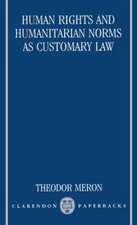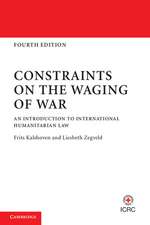Sovereignty and the Responsibility to Protect: A New History: Chicago Visions and Revisions
Autor Luke Glanvilleen Limba Engleză Paperback – 9 ian 2014
Preț: 298.67 lei
Nou
57.15€ • 59.99$ • 47.44£
Carte tipărită la comandă
Livrare economică 10-24 aprilie
Specificații
ISBN-10: 022607692X
Pagini: 304
Dimensiuni: 152 x 229 x 23 mm
Greutate: 0.43 kg
Ediția:New.
Editura: University of Chicago Press
Colecția University of Chicago Press
Seria Chicago Visions and Revisions
Notă biografică
Cuprins
Introduction
1. The Social Construction of Sovereign Responsibilities
2. Sovereignty in Early Modern Europe
3. The Rise of Popular Sovereignty
4. Sovereignty and the Non-European World
5. Sovereignty after the Second World War
6. The Rise of the Responsibility to Protect
Conclusion
Notes
References
Index
Recenzii
Descriere
In 2011, the United Nations Security Council adopted Resolution 1973, authorizing its member states to take measures to protect Libyan civilians from Muammar Gadhafi’s forces. In invoking the “responsibility to protect,” the resolution draws on the principle that sovereign states are responsible and accountable to the international community for the protection of their populations and that the international community can act to protect populations when national authorities fail to do so. The idea that sovereignty includes the responsibility to protect is often seen as a departure from the classic definition, but it actually has deep historical roots.
In Sovereignty and the Responsibility to Protect, Luke Glanville argues that this responsibility extends back to the sixteenth and seventeenth centuries, and that states have since been accountable for this responsibility to God, the people, and the international community. Over time, the right to national self-governance came to take priority over the protection of individual liberties, but the noninterventionist understanding of sovereignty was only firmly established in the twentieth century, and it remained for only a few decades before it was challenged by renewed claims that sovereigns are responsible for protection.
Glanville traces the relationship between sovereignty and responsibility from the early modern period to the present day, and offers a new history with profound implications for the present.




























